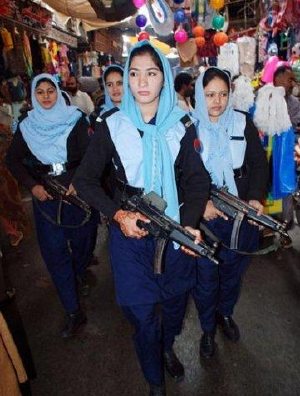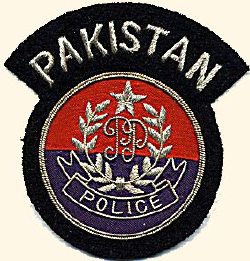 It is impossible to effectively address Pakistan’s myriad problems so long as security conditions continue to deteriorate. We are unable to control our own territory as armed militias and criminal gangs run amok in our cities, towns and villages.
It is impossible to effectively address Pakistan’s myriad problems so long as security conditions continue to deteriorate. We are unable to control our own territory as armed militias and criminal gangs run amok in our cities, towns and villages.
Sectarian violence is growing unabated. Business is fearful and the economy in tatters. Many of those with resources are making plans to migrate. Meanwhile, terrorist organisations freely launch attacks at home and abroad, with the government unable to provide security even in the capital.
Since we have sunk to this point mostly during Gen Musharraf’s nine years in power, it is time to re-examine the fundamental security strategy of Pakistan.
For decades the army has functioned under the increasingly questionable assumption that the greatest threat the country faces is a military confrontation with India. The armed services have accordingly consumed great proportions of Pakistan’s tight budget ($4.4bn for fiscal year 2008-2009, a seven per cent increase over the previous year) in preparation and readiness for a conventional war that they cannot win. As part of the same strategic objective, in the hopes of keeping large numbers of Indian troops (close to 700,000 at last count) occupied in Indian-held Kashmir, the army allegedly trained fundamentalist militant groups and encouraged them to wage attacks there.
At the same time, it is alleged that our military and intelligence establishment trained and supported the Taliban in Afghanistan with the purpose of having a friendly government on the western border over which Pakistan could exercise its influence (all part of the dubious policy of ‘strategic depth’ in case of a war with India). Of course, the predictable blowback from these operations has resulted in the current state of near-complete lawlessness in large parts of the country, as well as every province being awash in weapons.
Have any strategic goals been reached? No. Is the Kashmir problem any closer to a solution? No. Do we have a friendly government on our western border? No. What we have achieved is an insecure and crumbling state that could well become a pariah in the international community.
We have already demonstrated we possess a credible nuclear deterrent and must realise that we hurt only ourselves by imagining India as an enemy hell-bent on our destruction. India is a fast-growing economic giant, focused on lifting itself out of poverty. It has little to gain from any attempts to capture Pakistani territory and everything to gain by having a stable and prosperous neighbour as a trading partner. The Kashmir issue can and should be resolved through diplomatic pressure and international support.
In any case, we must ask ourselves whether the well-being of 170 million Pakistanis can be forever held hostage to the fate and future of the Muslim community in Indian-held Kashmir, especially after more than 60 years of support has not improved the situation for them one jot, but has led to disastrous results for us.
 The present danger to Pakistan comes from the lawlessness and terrorism in the country and the government’s inability to effectively project authority and guarantee the safety of its citizens. Jihadist organisations with foreign funding appear to have joined hands with the Taliban and their sympathisers to wreak havoc in the country with their ultimate retrograde dream of creating a mediaeval society where a draconian interpretation of the Sharia is enforced, women kept as chattel and modernity and progress defeated.
The present danger to Pakistan comes from the lawlessness and terrorism in the country and the government’s inability to effectively project authority and guarantee the safety of its citizens. Jihadist organisations with foreign funding appear to have joined hands with the Taliban and their sympathisers to wreak havoc in the country with their ultimate retrograde dream of creating a mediaeval society where a draconian interpretation of the Sharia is enforced, women kept as chattel and modernity and progress defeated.
Some of these groups are determined to attack and intimidate, if not eliminate, religious minorities. Then, we have the heavily armed militias affiliated with political parties. Finally, there are the criminal gangs involved in drug trafficking, kidnapping, carjacking, extortion, armed robbery and murder.
The idea that the army can somehow defend the country against this lawlessness is ludicrous. How can the armoured corps help fight sectarian car-bombings in Karachi? How will yet another squadron of F-16 aircraft defeat the drug smugglers in Lahore? How does the infantry do the detective work necessary to bring kidnappers and carjackers to justice? How can the army deal with the creators of mayhem that are thoroughly dispersed within our population, in every town and every city? It cannot. Yet the armed forces consume a hugely disproportionate share of Pakistan’s federal budget.
So, here is my suggestion: reduce the size of the Pakistan armed forces by a third, and use the money saved to dramatically increase the police budget. Currently defence spending is 20 per cent of the federal budget, while slightly over one per cent is spent on policing. This move will allow at least a six- to seven-fold increase in the police budget. Give our brave police the salary, equipment, training and manpower they need to bring law and order back to our cities and towns. They are the ones paying the highest price in terms of lives, and they are the only ones with a chance of controlling the proliferation of weapons and our epidemic of crime and terrorism.
Explain the decision candidly to our neighbours, refuse to be drawn into a no-first-strike nuclear policy and make a security pact with the United States to deter any hostile actions by India. It is in both those nations’ interest that Pakistan be stable and well-policed. This will also have the salutary effect of significantly reducing corruption in the country, and will result in an atmosphere of security and justice in which healthcare and education can be delivered effectively, and business can start dealing with the challenges of the 21st century economy.
Syed Abbas Raza, editor of 3QuarksDaily (3QD), wrote this piece for Dawn.




















































@ Aamir Ali
“The Pakistan Army is one of the few viable institutions in the country”
Sure it is, because it is the only institution that has money lavished on it. When you set up a police force that is poorly trained, poorly armed, and poorly paid, and then complain that the force is ineffective, what do you think will be the result? The point of the article is to change that to improve the security situation. Furthermore even if the army/ internal security force is better trained than the police it is a broadsword not a scalpel. Yes it can blow things up pretty well and launch offensives against the Talibs, but then what? Does it understand how to act as a policing force against suicide bombers, stop ordinary crime, and create a safe security environment for the populace?
“The economy grew very well during Musharraf’s time”
Yea, because the Americans were dumping money left and right on Pakistan. The govt was spending money like crazy with no care of fiscal responsibility and the country was shopping on consumer credit creating huge trade deficits with the Chinese. Not to mention that virtually none of this buying spree involved improving infastructure (like the electrical grid). Now Pakistan is paying the piper, you can’t borrow forever.
@Shahid
“The army can manage a smaller defence budget by controlling spending and not wasting money on maintaining a lavish lifestyle for its senior command.”
You have got to be kidding me. Pakistan exists to serve its army not the other way around. Even Pakistan’s glorious president, Zardari, is regularly humiliated by the army and told what to do (this is not imply that I think highly of Mr. 10% ).
@Khurram Habib
“We need to start manufacture things like China & India. If they can do it, then why can’t we?”
Manufacturing [China] and India [Outsourcing] requires large investments in infastructure or education. Too bad all the money goes elsewhere and the rest goes to ghost schools. Another large problem is the free trade agreement with China. Cheap Chinese goods flood the market eliminating and possibility of a local manufacturing and populace purchases such Chinese goods on credit creating huge trade deficits.
This argument that the army is only viable and trained institution in the country is fallacious. If you spend as much money on any institution as you do on the army — be it on education, health, justice system, law enforcing, anything — you will produce an equally viable and effective institution. It is the question of money and your priorities.
The economy grew very well during Musharraf’s time, it is in tatters today because the current govt is ignorant of economics, despite the 5x increase in aid to Pakistan. You can also blame militias and jehadis rightfully of Gen Zia ul Haq what started this whole nonsense in 1979.
The police are trained for normal duties and cannot deal with militias. That has been proven multiple times in Swat, Lal masjid and elsewhere. What is needed is an internal security force like the Pakistan Rangers, who have better equipment and training than the police, and who can deal with heavily armed criminals and militants, with the army as last line of defense.
The Pakistan Army is one of the few viable institutions in the country, and has made the difference in Swat, Lal Masjid and Baluchistan. Please don’t mess with it. There is plenty of money in the budget for a third-world country like Pakistan, if the money is spent effectively and not on 70 member cabinets.
It’s a good idea. A sensible idea. But our track record shows we don’t sensible things. The very idea of having nuclear weapons was to have a such a deterrent that we don’t need a large army to fight a conventional war. But ended up having both nuclear weapons and a very large and expensive army.
Probably I being too cynical, but my guess is we will first have a large police, but then wouldn’t reduce the size of the army.
Piaaz bhi khao aur korray bhi.
But the idea is good, if followed the way it is meant.
Shirazi Sahib,
As the author pointed out, we cannot bear the financial burden of maintaing a conventional armed forces and a vast nuclear arsenal. The defence spending has been asked to be shrinked which might require the army’s strength to be reduced as well. The army can manage a smaller defence budget by controlling spending and not wasting money on maintaining a lavish lifestyle for its senior command.